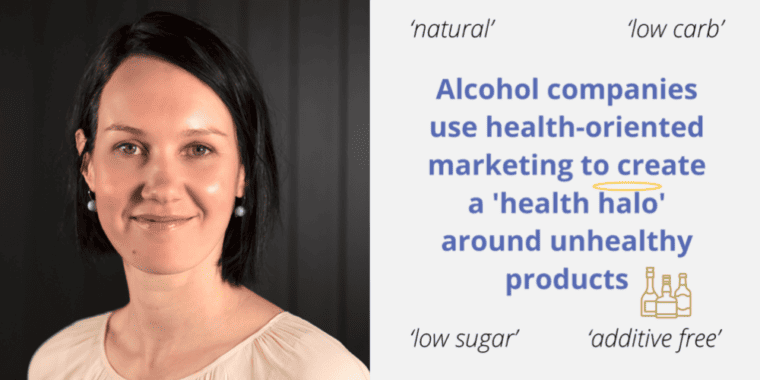
Alcohol in any amount is harmful to health. However, the alcohol industry commonly uses marketing cues to create the illusion of a healthier product.
In our new study, we found health-oriented marketing of alcohol appears on 54% of selected alcohol products on the Australian market. This type of marketing included claims such as ‘natural’, ‘vegan’, ‘low sugar’, ‘low carb’, ‘additive free’, and images and claims implying fruit or natural ingredients.
But despite the alcohol industry positioning these products as ‘better for you’, they still tended to be full strength alcohol on average (5.2% ABV) and only marginally lower in alcohol content than products without health-oriented marketing (6.0% ABV). These differences are unlikely to offer a health benefit.
This and other recent work conducted in Australia and the United Kingdom shows there is a lack of information about the nutrition content of alcohol products available to consumers, leaving them open to the influence of these selective marketing claims.
The study
Our study surveyed all beer, ciders, ready-to-drink (RTD) premixed drinks and selected wines on the website of Australia’s largest liquor retailer.
Claims that a product was ‘natural’ or contained fruit ingredients were most common and appeared on 41% and 63% of ciders respectively. Claims touting the ‘low sugar’ content of products were the most common nutrient claim and mostly appeared on RTDs (20%), that are largely marketed to and consumed by young women.
Such claims may distract consumers from the serious health harms associated with alcohol consumption. Apart from the harms associated with alcohol’s toxic effects, it is also energy dense. Nutrient claims in particular may also detract from the (already low) appreciation of alcohol’s contribution to energy in the diet.
Among Australian drinkers, national surveys show that alcohol contributes 13.4% of daily energy intake and is the largest discretionary source of energy in the diet. We found that alcohol products displaying health-oriented marketing were lower in energy content than those without, although our conclusions were limited by the fact that nutrition information was only made available for 12% of alcohol products.
However these differences were of unclear practical significance and certainly do not suggest that alcohol products with health-oriented marketing are a healthy choice. Further, while overweight and obesity are important contributors to disease burden, the energy content of an alcoholic beverage is by no means the most important consideration in the healthiness or potential harm of consuming alcohol.
What changes might help?
The prevalence of health-oriented marketing on alcohol products by the alcohol industry is in stark contrast to their resistance to the mandatory placement of objective and standardised health information on labels.
In Australia, the alcohol industry opposed the introduction of mandatory pregnancy warnings and were successful in campaigning for them to be relegated to the back label when introduced in 2020. They also strongly resist general health warning labels to preserve ‘valuable label real estate’. Many Australians are not aware of the serious health impacts of alcohol and this is a gap that labelling reforms could help to address to potentially reduce population-level alcohol consumption.
Consultation is currently underway in Australia and New Zealand to consider proposals for mandatory energy labelling of alcohol products and bans on nutrient content claims (e.g., ‘low sugar’, ‘low carb’). The UK government also announced in 2020 that they would consult on mandatory energy labelling of alcohol as part of the new Obesity Strategy.
These proposed changes will go some way toward ensuring consumers have access to objective standardised information about alcohol products and to remove some forms of misleading marketing. However, there is still much work to be done to ensure alcohol labels adequately communicate associated harms and do so in a context free of misleading industry spin that detracts from those serious health harms.
Written by Dr Ashleigh Haynes, David Hill Research Fellow, Cancer Council Victoria, Australia
All IAS Blogposts are published with the permission of the author. The views expressed are solely the author’s own and do not necessarily represent the views of the Institute of Alcohol Studies.
